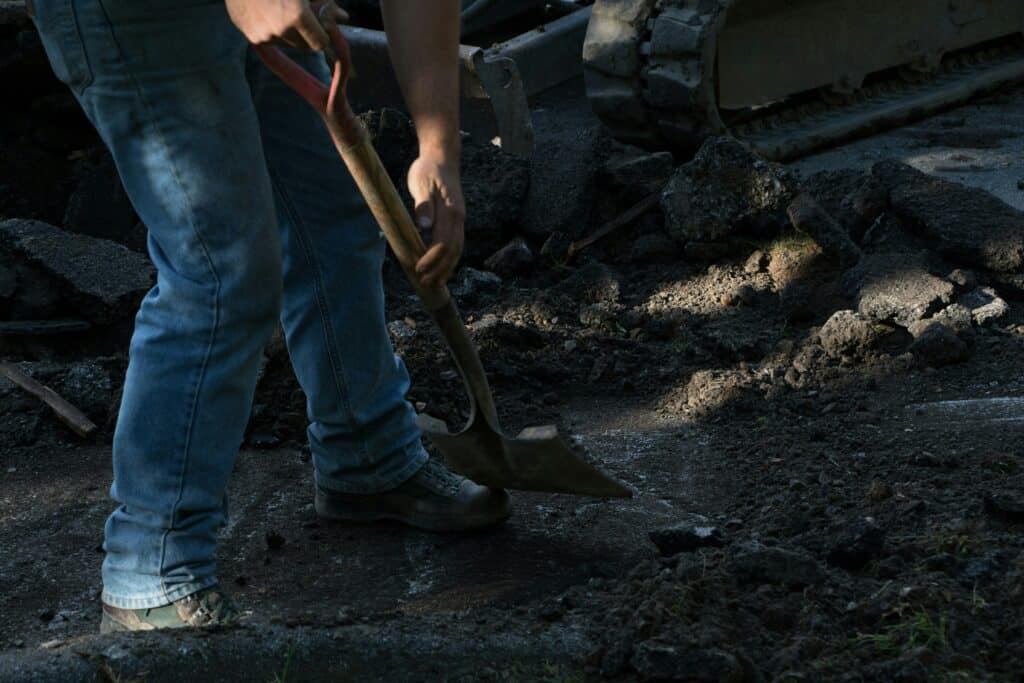Embarking on a hardscaping project can transform your outdoor space, adding functionality, aesthetic appeal, and value to your property. In this article, we’ll explore the question: “Do I need a permit to hardscape?” and shed light on the importance of complying with local regulations.
Whether you’re planning to install a patio, construct a retaining wall, or pave a driveway, it’s crucial to understand the permitting requirements associated with hardscaping projects.
Regulations can greatly vary from region to region, so our first tip is to always check with your local authorities. That being said, let’s discuss some of the common hardscape permits you might require.
You may also like: How much does hardscaping cost?

Do I need a permit to hardscape?
Navigating the regulatory landscape is crucial when undertaking hardscaping projects, as the necessity for a permit is intricately tied to the diverse regulations set by local governments.
The regulatory framework encompasses a range of factors, including zoning laws, environmental considerations, and safety codes, all of which exhibit significant variations across municipalities.
Zoning laws dictate how land can be used within a specific area, outlining permissible activities and structures.
In the context of hardscaping, these laws might govern the type, size, and location of features such as patios, decks, or retaining walls. Understanding these zoning regulations is vital to ensuring that your hardscaping project aligns with the designated land use for your property.
Environmental considerations play a pivotal role in determining whether a permit is required. Some municipalities have stringent rules in place to protect natural resources, wetlands, or other environmentally sensitive areas.
Hardscaping projects that involve substantial excavation, alterations to drainage patterns, or construction near water bodies may trigger environmental reviews and necessitate permits to mitigate potential ecological impacts.
Safety codes represent another crucial aspect of the permitting process. These codes are designed to ensure that structures, including hardscape features, meet specific safety standards.
For example, retaining walls, outdoor kitchens, or fire pits may need to adhere to certain construction guidelines to prevent hazards and accidents. Compliance with safety codes helps guarantee the well-being of both residents and neighboring properties.
Finally, local governments exhibit a spectrum of permit requirements, with some areas imposing stringent guidelines while others adopt more lenient approaches.
It is incumbent upon property owners to be proactive in understanding and adhering to these regulations. Failure to obtain the necessary permits can result in legal repercussions, fines, or even the requirement to dismantle non-compliant structures.
To embark on a hardscaping project without unnecessary complications, prospective builders should initiate contact with their local building department or municipality.
Consulting with these authorities allows individuals to gain clarity on the specific permit requirements applicable to their project. In some instances, municipalities may provide informational guides or online resources to facilitate a smoother permit application process.
Common hardscaping permits in the U.S.
Patios and decks
Many municipalities require permits for the construction of patios and decks. This ensures that the structures meet safety standards and comply with zoning regulations, especially if they alter the footprint of the property.
Retaining walls
Retaining walls are subject to permitting in numerous locations due to their potential impact on soil erosion and stability. The height and location of the wall often determine whether a permit is necessary.
Driveways and walkways
Installing or modifying driveways and walkways may require permits to ensure proper water drainage, compliance with building codes, and adherence to zoning regulations.
Outdoor kitchens and fireplaces
If your hardscaping project involves the construction of outdoor kitchens or fireplaces, permits may be necessary to address safety concerns and compliance with local building codes.
Swimming pools and hot tubs
The installation of swimming pools and hot tubs is a significant hardscaping project that typically necessitates permits. Municipalities often regulate these structures to ensure compliance with safety standards, proper fencing requirements, and adherence to setback regulations to prevent potential hazards.
Gazebos and pergolas
The construction of gazebos and pergolas may require permits, as these structures can impact the visual aesthetics of the property and the neighborhood. Zoning regulations and setback requirements are often taken into account to maintain harmony with the surrounding environment.
Outdoor lighting systems
If your hardscaping project involves the installation of extensive outdoor lighting systems, especially those connected to the electrical grid, permits may be necessary. Compliance with electrical codes and safety standards is crucial to prevent potential hazards and ensure the proper functioning of the lighting setup.
Fountains and water features
The addition of fountains, ponds, or other water features to your landscape may require permits to address potential water usage, environmental impact, and safety concerns. Municipalities may have specific regulations to safeguard against water contamination and to ensure the responsible use of water resources.
Play structures and playgrounds
Constructing play structures or playgrounds within your property may require permits, particularly if they involve elevated structures, swings, or other potential safety hazards. Ensuring compliance with safety standards and adherence to setback regulations is essential to protect the well-being of users.

Do I need a permit to hardscape? How to get a definitive answer
As you can see, there are many scenarios where you might need a permit to hardscape. However, local regulations are not always clear and sometimes tricky to get a hold of – that’s why working with professional hardscape contractors is your best course of action.
Professionals around your area can help you make not only the best choices of materials and techniques, during the installation process, but also inform you of local regulations and help you get all the permits you might need.
We here at S&S Pavers have provided that kind of help for countless homeowners around the Sarasota and Manatee counties, in FL, during our 14 years of experience in the hardscape business, so we know how important hardscape permits can be.
If you are around our area of activity, you can always contact us for a free estimate on our services – we can provide the same kind of help for you!





